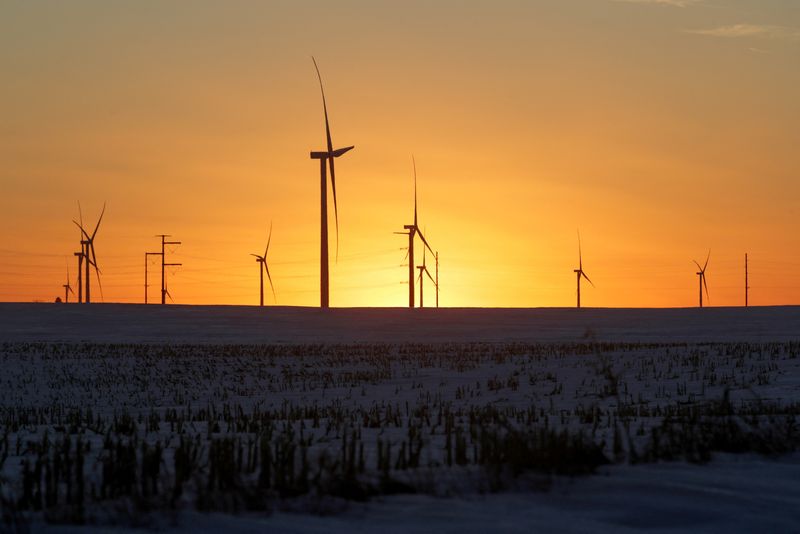By Danilo Masoni
MILAN (Reuters) - Renewable energy shares, reeling from an investor retreat, face extended uncertainty as the U.S. election has added to wariness, leaving only selected stocks poised to benefit from any boost lower interest rates could provide to funding.
The sector achieved bubble-like valuations in 2020-21, as major funds piled in, attracted by falling development costs.
Since then, the gains have been reversed by factors including renewable competition from China, a resurgence in the returns on conventional energy, and structural issues for renewable sources linked to supply chain disruption, a shortage of grid connections and planning issues.
For the United States, the Inflation Reduction Act (IRA) has proved a spur to renewable investment, including in some Republican states, which leads some analysts to say its benefits will continue.
Others say the prospect of former Republican President Donald Trump returning to the White House will channel funding into fossil fuels as he has promised more oil drilling. They say a win by Democrat Kamala Harris would be needed to restore confidence in renewables.
Even then, a recovery would not be of the scale of the 2020-21 boom, they say.
"Rates are coming down, fine, but that actually doesn't solve competition issues or end-market demand, which is still there, but on a lower growth trajectory than before," said Will McIntosh-Whyte, fund manager at Rathbones Asset Management in the UK, which manages both sustainable and traditional investment mandates.
Alternative energy funds have recorded net outflows for 17 straight months, the longest losing streak on Lipper data going back to September 2019. So far in 2024, investors have withdrawn more than $11 billion, bringing assets to $54.2 billion. During the boom of 2021 at this point in the year, net inflows topped $29 billion.
In 12 months, the retreat has meant a 28% drop in the number of outstanding units in the iShares Global Clean Energy ETF (NYSE:XLE), whose biggest holdings include U.S. solar tech company First Solar (NASDAQ:FSLR) along with British utility SSE (LON:SSE) and China's Yangtze Power.
The MSCI Global Alternative Index is set for its fourth year of declines, down 18% year-to-date, whereas global stocks have gained 17%. The index is trading at a 2.7% discount to world stocks, on a forward price-to-earnings metric, compared with peak premium of 25-50% in 2020-22.
SHORT SHIFT
The outbreak of the Ukraine war in 2022 led to record returns for major energy companies and in some cases to a rethink on strategies to shift to renewable energy.
Rathbones' McIntosh-Whyte and other fund managers said the renewables sector was still worthy of investment but through companies where that is not the only driver of growth.
Analysts have said one way to gain exposure is through grid operators, such as Italy's Terna and Spain's Iberdrola (OTC:IBDRY), whose regulated business is less volatile than pure renewable plays.
Some fund managers have shifted from being long to short on the green energy transition.
Offshore wind developer Orsted (CSE:ORSTED) is among the STOXX's top-40 shorted stocks, according to Mediobanca (OTC:MDIBY) Research. Investors are waiting for Orsted to sell more assets to help it repair its finances and have voiced concern that a Trump win could put some of its U.S. projects at risk of not getting permits.
Swiss wealth manager LFG+ZEST has opened a short position on Danish wind turbine maker Vestas and Portugal's EDP Renovaveis on the view that, regardless of the U.S. election, sector profits will remain under pressure.
"Most of these firms are highly indebted, profitability is low, and, while growing, margins are getting incrementally worse," said Alberto Conca, chief investment officer at LFG+ZEST.
Vestas, the fifth-worst performer on the region-wide FTSE Eurofirst 300 index this year, experienced a 39% drop. It reports quarterly results on U.S. Election Day, along with Orsted.
Vestas and Orsted declined to comment to Reuters, while EDP Renovaveis did not respond immediately.
Nordea strategist Hertta Alava in Helsinki said Chinese competition, which she says has been aggressive in solar panels and intensifying in wind turbines was a major concern for Western investors.
Rate cuts so far have not been enough to stimulate clean energy investments, she said, and many decisions had been put on hold pending clarity on the outcome of the U.S. vote.
Saying clean energy had become "a stock-pickers' market," she said some actively managed renewables funds have outperformed indices by a wide margin.

She did not give examples.
Those that have bucked the trend include Robeco Smart Energy, an actively managed $3.2 billion fund, which is up around 10% this year.Other outperformers are India's Suzlon Energy, which has installed wind energy farms in 17 countries, is up over 80%. First Solar is up 19%.